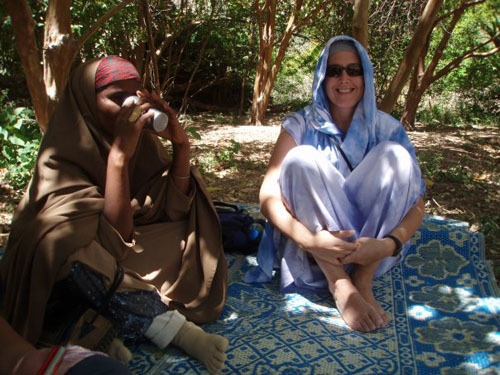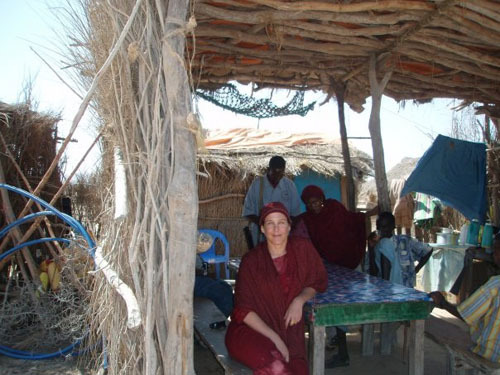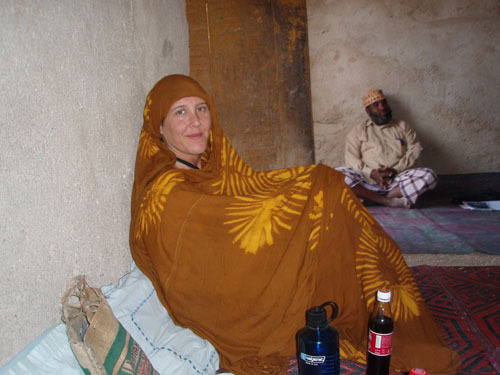Cedarhurst native recalls wartime Somalia
Lawrence High School alumna Hillary Nussbaum spent the night of her 40th birthday not in the Five Towns, but in a Land Cruiser traversing dirt and desert terrain in the north of Somalia working for Horn Relief, a non-governmental organization (NGO) headquartered in Kenya. Nussbaum today is 43, living in Boulder, Colorado, but three school-age girls living in Kenya have kept her bound in spirit to Africa.
Nussbaum has a graduate degree from Columbia University in international affairs, and has been working in international development intermittently for 12 years. Between November 2006 and August 2007, Nussbaum worked for Horn Relief coordinating a field staff of about 60 humanitarian responders to the ailing Somali population, half of which are in urgent need of humanitarian assistance, with one in five children being acutely malnourished, according to the United Nations High Commissioner of Refugees.
Somalia is a lawless country, fractured by clan loyalties, violence and civil war. Outbreaks of fighting and the abduction and murder of humanitarian workers have made it difficult for relief agencies to aid the 1.4 million Somali refugees displaced from their homes, according to UNHCR. There is an undersupply of adequate water, food, medical care and shelter.
For most of the 20th century, Somalia was a moderate Islamic country, whose Muslim character was inflected with African folk religious practices. By the time Nussbaum arrived in November 2006, all the women had covered their arms, legs, hair and neck to meet Islamic standards of modesty, which were not the societal norm before the outbreak of civil war in 1991, when rebels with the United Somali Congress attacked Mogadishu, and ousted Somali President Mohamed Siad Barre. Since that time, violent factionalism and civil war have plunged the country into political chaos.
Nussbaum, who is Jewish, said she adhered to modesty standards, and told no one in the country, with the sole exception of her own supervisor, about her religion. The Cedarhurst native kept this quiet because of not wanting to risk losing the full cooperation of the staff and the communities she worked with.
Almost immediately after Nussbaum arrived on Somali soil, tapping her skills from grad school and with the guidance of field manuals, she had to assemble a flood relief effort after excess rainfall caused the Shabelle and Juba rivers to flood. Whole villages and farmlands were submerged, with some locations being cut off by road from sources of relief.
While the World Food Programme distributed food, Horn Relief was charged with distributing blankets, tarp, buckets, soap, clean water tablets (Iodine) and other necessities. Horn Relief hired a Kenyan woman to call Kenyan suppliers. Nussbaum's people on the ground were charged with distribution, and discerning the flood victims from the others living among them in camps.
On Dec. 15, 2006, humanitarian organizations with a presence in Somalia held a briefing, outlining which areas were affected and how to access them. Horn Relief at first shipped its relief items on a World Food boat, but more flooding made the waterway an unusable route. When the supplies were put on trucks they were stopped at the border, which had been closed after Ethiopian troops entered the country to intervene, with support for the official Transitional Federal Government of Somalia. TFG was battling a coalition of Islamist warlords known as the Union of Islamic Courts.
Ultimately, someone from Horn Relief had the right contact on the border, and some trucks were allowed through. Other supplies were transported by helicopter to flooded areas to beat the spread of water-borne disease.
Who She Left Behind
While in Kenya, Nussbaum became taken with the three daughters of her housekeeper at the Horn Relief Guesthouse apartment, who were being schooled in a slum without books, or even a regular teacher. The children were taught mostly in Swahili, though English is the official language of Kenya. The two younger girls were at a free school, and their older sister went to a high school supported by a church, whose nominal tuition, books and uniform their mother could not afford.
Under Nussbaum's sponsorship, the girls have each entered private schools. Teckla, now age 18, Esther, age 14, and Faith, age 11 are adjusting to the different standards. The cost, which includes tuition, room, board, school trips, books and other fees is approximately $4,500 for all three girls.
The girls' first cousins recently lost their mother. Nussbaum had been hoping to add them as additional grantees. This past autumn however, she was laid off from the job she held after returning from Africa, helping to finance projects which seek to reduce greenhouse gases. Her personal job loss, compounded with the fact that others have not been able to contribute as they have in the past, has left the girls without sponsorship. She is hoping Five Towns residents will help contribute to a scholarship fund. For further information or to contribute, email hnussbaum5@hotmail.com.
Comments about this story? LGross@liherald.com or (516) 569-4000 ext. 210.











